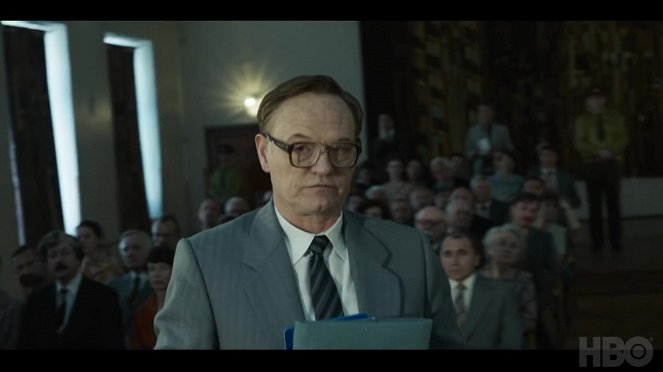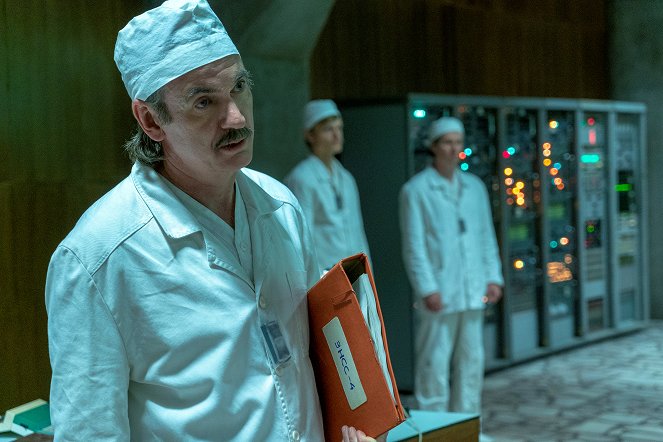Artistes:
Craig MazinRéalisation:
Johan RenckScénario:
Craig MazinPhotographie:
Jakob IhreMusique:
Hildur GuðnadóttirActeurs·trices:
Jared Harris, Stellan Skarsgård, Emily Watson, Jessie Buckley, Paul Ritter, Adam Nagaitis, Robert Emms, Sam Troughton, Con O'Neill, Adrian Rawlins (plus)VOD (2)
Épisodes(5)
-
1:23:45 (E01)
-
Veuillez garder votre calme (E02)
-
Que la terre s'ouvre ! (E03)
-
Le Bonheur de toute l'humanité (E04)
-
Vichnaya Pamyat (E05)
Résumés(1)
Chernobyl est une mini-série captivante mettant en scène Jared Harris, Stellan Skarsgård et Emily Watson. Elle retrace les événements de l'une des catastrophes les plus dramatiques de l'Histoire : l'explosion, en 1986, d'un réacteur de la centrale nucléaire de Tchernobyl, en URSS. (Warner Bros. Home Ent. FR)
Vidéo (9)
Critiques (16)
Les écarts factuels occasionnels et autres simplifications rencontrées ci et là n’ont aucune importance dans l’histoire. Ce qui importe est que les créateurs ont réussi à capturer l’esprit de l’époque, former par le biais des personnages une accusation objective d’une idéologie mensongère et montrer jusqu’où les choses peuvent mener quand on se met à jouer avec les éléments naturels et quand entre en jeu l’obligation d’exécuter des plans – le tout sous une forme réellement naturaliste et crue. Dès le premier épisode, le spectacle à la fois incommodant et incroyablement marquant, soutenu par d’excellents jeux d’acteurs (Jared Harris et Stellan Skarsgůard sont excellents, bien que ce soit l’époustouflant Paul Ritter qui m’ait le plus marqué, tellement il parvient à reproduire précisément son personnage qui est le produit de la période concernée). Je dois dire que j’ai eu le véritable knockout du spectateur seulement au dernier épisode avec la reconstitution du test critique – connaissant d’avance son résultat, j’en ai eu des frissons du début à la fin. Pour résumer, les créateurs ont choisi une composition remarquable dont le début vous stupéfie, le milieu vous épouvante et la fin vous anéantit. Un travail cinématographique conséquent et de qualité.
()
Ceci n'est pas d'une série, mais d’un film captivant de 5 heures qui rend hommage à tous ceux qui ont contribué à mettre fin à un désastre environnemental potentiellement encore plus grave que celui qui s’est réelement produit à l’époque. Il nous fait vivre les différentes étapes qui ont suivi l'explosion, nous permettant de ressentir cette tragédie humaine et cette catastrophe nationale sous différents angles (des pompiers au président Gorbatchev). Les tirs sur les chiens contaminés, les mineurs se portant volontaires et leur leader, la compréhension et le respect grandissant entre les protagonistes masculins principaux (le scientifique Harris et le politicien Skarsgård), les corps irradiés qui se décomposent dans les hôpitaux. L'attitude épouvantable du chef du KGB et la conception du casting et son jeu d'acteur en général...Ce film regorge d'éléments narratifs forts, c'est incroyable. Il reflète de manière glaçante le système politique négligent, mensonger et sans caractère sur lequel l'Union soviétique a construit sa « gloire », pour finalement se laisser ronger de l'intérieur.
()
Once again, HBO gave us their absolute best and introduced the viewers to an elaborate adaptation of the most significant nuclear catastrophe to ever happen on Earth. And even though they didn’t cover everything they could have in 5 episodes, they covered everything they needed so they could sell the idea and pass something on at the same time – the repulsiveness of the Soviet regime but also the proof that humanity and heroism exist everywhere. The first two episodes were probably the most important for me, the creators shocked me with the exteriors, which gave me the impression that the crew actually left for Pripyat and filmed theseries about the catastrophe there. The finale is very crucial as well; it shows what the Soviet regime was capable of doing to not only ordinary people but also intellectuals. After all of that, I am not at all surprised that Gorbachev said in the 1990s that Chernobyl was the fatal consequence of the fall of the Soviet Union. What they did there only underscores the whole effect of communism in Russia of the period, where the local “elite” thought they could do whatever they wanted and God in turn showed them that it wasn’t entirely true. Thankfully this didn’t mean the demise of all of us, it was “only” a warning concerning what we are doing wrong in the world. The fact that we are unable to learn our lessonis another matter. However, this is one of the reasons why the series is so important, which is why it is good to see, perceive, and experience it until the very end. The absolute best of this year’s series and in terms of the HBO production, it is the best that could have been created. Precise, accurate, and apt.
()
This is an event. The initial puzzlement has a quick half-life, as those disembodied moments eventually stand out more than the tangible pressure. It’s a screenwriting university on how to handle the "based on a true story" license while staying in observation mode. It’s a perfect study of human arrogance, lack of humility, and unwillingness to face the truth. A live broadcast of lies that has been coming to us for over thirty years. With all due respect to all the criticisms, the hype is well deserved.
()
Human memory is set up in such a way that the major events around us are similar for most people; we remember exactly what we were doing that day. I have that with 11 September, 2001, and with Chernobyl. The day it went up, we had beautiful, cloudless, sunny weather and half the town was catching rays by the dam, myself included. A light rain fell in the evening, although according to the forecast it was not supposed to rain. And I believe that it’s not just my imagination, because it’s said by more witnesses, but the next weeks the milk tasted differently, probably the comrades put iodine in it or something. The comrades covered up and covered up, and then when it blew up, what I found terribly funny was that the first mention of the catastrophe was only on the third or fourth page of the newspaper, a little footnote. And about the series: excellent stuff, no-nonsense, heading straight for the chamber, without carrying any unnecessary plot ballast. That’s how it should be.
()



Annonces